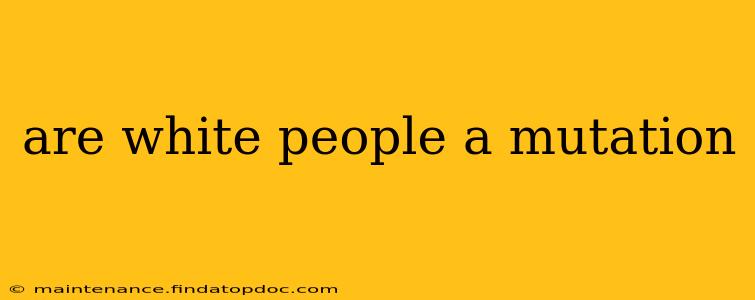Are White People a Mutation? Understanding Human Genetic Variation
The question of whether white people are a mutation is fundamentally flawed. It stems from a misunderstanding of human evolution and genetic diversity. There is no single "white" gene, and the concept of race itself is a social construct, not a biological reality. Genetic variation exists across all populations, and the characteristics we associate with different racial groups are the result of complex interactions between multiple genes and environmental factors, not a single, defining mutation.
What is a Mutation?
Before delving deeper, let's clarify the term "mutation." A mutation is a change in the DNA sequence of an organism. These changes can be beneficial, harmful, or neutral, depending on their effect on the organism's survival and reproduction. Mutations are a fundamental driving force of evolution, providing the raw material for natural selection to act upon. They occur randomly and constantly throughout a population.
Human Genetic Diversity and Migration Patterns
Humans share the vast majority of their DNA. The variations we observe – including skin color, hair texture, and other physical traits – are due to relatively small differences in our genetic code. These differences arose through a long and complex process involving migrations, geographic isolation, and adaptation to different environments. Our ancestors originated in Africa and migrated to different parts of the world over tens of thousands of years. As they spread, they encountered different climates and selective pressures, leading to variations in their physical traits. For example, lighter skin pigmentation evolved in regions with less sunlight to facilitate Vitamin D synthesis.
Skin Pigmentation: A Case Study
Skin color is a frequently cited example in discussions of human genetic variation. It's largely determined by the amount and type of melanin, a pigment produced by melanocytes in the skin. Genes regulate melanin production. Different versions (alleles) of these genes lead to variations in skin pigmentation. Lighter skin isn't a single mutation but is a result of multiple gene variations that became more frequent in populations in regions with less intense sunlight.
The Social Construct of Race
It's crucial to emphasize that "race" as a biological category is not supported by scientific evidence. The categories we use to classify people by race are largely social constructs based on historical and cultural factors, not distinct genetic groupings. While genetic variation exists, it doesn't neatly align with the arbitrary racial categories we've created. Genetic diversity is far greater within so-called racial groups than between them.
Are there genetic differences between populations?
Yes, there are genetic differences between populations, but these differences are subtle and don't define distinct "races." These variations reflect adaptations to different environments and don't imply any inherent superiority or inferiority of one group over another.
In conclusion, the idea of white people being a mutation is a misconception. Human genetic variation is complex and reflects a long history of migration, adaptation, and natural selection. The social construct of race does not have a valid biological basis.
